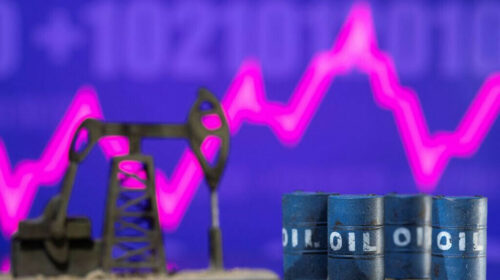President Joe Biden has repeatedly urged U.S. oil companies to step up production in a bid to increase oil supply and ease fuel prices. However, it appears his pleas have been falling on deaf ears considering the dearth of oil and gas exploration–which is, of course, perfectly understandable given his historic hostility toward fossil fuels as well as the very real risk that new drilling won’t pay off over the long term. When the energy crisis hit a nadir two years ago, highly indebted oil and gas companies quickly changed their playbook, adopting stricter cost discipline, cutting back on expensive drilling programs and vowing to return more cash to shareholders in the form of dividends and buybacks.
Many energy companies are still reluctant to go back to their trigger-happy exploration and drilling days despite high oil and gas prices and record profits, and have mainly been falling back on their dwindling stocks of drilled but uncompleted wells (DUCs) to keep going. Norwegian energy intelligence firm Rystad Energy has revealed that a mere 44 oil and gas lease rounds will take place globally this year, the fewest since the year 2000 and a far cry from a record 105 rounds in 2019.
According to the Norwegian energy punter, only two new blocks had been licensed for drilling in the U.S. as of the end of August this year with no new offers for oil and gas leases originating with the Biden administration itself. Indeed, the handful of auctions that have gone ahead under Biden or bled into his presidency were decided upon during the presidency of Donald Trump. Meanwhile, Rystad has revealed that Brazil, Norway and India are the world leaders in terms of new licenses.
Dwindling Reserves
But such low levels of exploratory interest is not sustainable and might come back to bite the world before long.
A year ago, Rystad Energy warned that Big Oil could see its proven reserves run out in less than 15 years, thanks to produced volumes not being fully replaced with new discoveries.
According to Rystad, proven oil and gas reserves by the so-called Big Oil companies namely ExxonMobil (NYSE: XOM), BP Plc. (NYSE: BP), Shell Plc (NYSE: SHEL), Chevron (NYSE: CVX), TotalEnergies ( NYSE: TTE), and Eni S.p.A (NYSE: E) are rapidly falling, as produced volumes are not being fully replaced with new discoveries.
The main culprit: Rapidly shrinking exploration investments.
Global oil and gas companies cut their capex by a staggering 34% in 2020, in response to shrinking demand and investors growing wary of persistently poor returns by the sector. Capex is only set to rise ~12% in the current year.
ExxonMobil, whose proven reserves shrank by 7 billion boe in 2020, or 30%, from 2019 levels, was the worst hit after major reductions in Canadian oil sands and US shale gas properties. Shell, meanwhile, saw its proven reserves fall by 20% to 9 billion boe last year; Chevron lost 2 billion boe of proven reserves due to impairment charges while BP lost 1 boe. Only Total and Eni have avoided reductions in proven reserves over the past decade.
Where the action is
But there’s still hope, with exploratory activity growing in some regions.
The UK has announced plans to open up the North Sea for oil and gas exploration with more than 100 licenses likely to be issued for the coast off Yorkshire, Lincolnshire and Norfolk. However, this is unlikely to become a trend across Europe due to strict climate mandates, meaning the continent might have to at least consider the final frontier as it looks to solve its energy crisis: Africa.
Vijaya Ramachandran, director for energy and development at the Breakthrough Institute, has urged Europe to look to Africa if it’s serious about achieving energy security. Ramachandran notes that the continent is endowed with substantial natural gas production, reserves, and new discoveries in the process of being tapped. Very little of Africa’s gas has been exploited, either for domestic consumption or export.
Algeria is already an established major gas producer with substantial untapped reserves and is connected to Spain with several undersea pipelines. Germany and the EU are already working to expand pipeline capacity connecting Spain with France, from where more Algerian gas could flow to Germany and elsewhere. Libyan gas fields are connected by pipeline to Italy. In both Algeria and Libya, Europe should urgently help tap new fields and increase gas production. New pipelines under discussion currently focus on the Eastern Mediterranean Pipeline Project, which would bring gas from Israel’s offshore gas fields to Europe.
But the biggest African sources lie south of the Sahara–including Nigeria, which has about a third of the continent’s reserves, and Tanzania. Senegal has recently discovered major offshore fields.
Ramachandra says Germany should not ignore these opportunities. For instance, the proposed Trans-Saharan pipeline will bring gas from Nigeria to Algeria via Niger. If the project is completed, the new pipeline will connect to the existing Trans-Mediterranean, Maghreb-Europe, Medgaz, and Galsi pipelines that supply Europe from transmission hubs on Algeria’s Mediterranean coast. The Trans-Saharan pipeline would be more than 2,500 miles long and could supply as much as 30 billion cubic meters of Nigerian gas to Europe per year–equivalent to about two-thirds of Germany’s 2021 imports from Russia (For comparison purposes, the Yamal-Europe pipeline, one of the major routes for Russian gas to Europe, is 2,607-mile-long). On its part, Nigeria is enthusiastic about exporting some of its 200 trillion-cubic-foot reserves of gas, with Nigerian Vice President Yemi Osinbajo arguing in favor of natural gas’ critical role, both as a relatively clean transition fuel and as a driver of economic development and foreign exchange earner.
Unfortunately, the Trans-Saharan pipeline will likely take a decade or more to complete, and LNG shipments to Germany would bring quicker relief.
But, again, Berlin’s bizarre energy policies have gotten in the way: Germany has not built a single LNG import terminal as part of its policy to make the country dependent on Russian gas and in turn make Russia more dependent on Germany. But there’s hope: Berlin has already renounced its old ways and says it will now build LNG infrastructure.
Luckily for Germany and other stranded EU nations, Ramachandran says LNG loading ports can be built reasonably quickly in Africa, with the Greater Tortue Ahmeyin field, an offshore gas deposit straddling the maritime border between Senegal and Mauritania, a prime example. When the field comes online next year, it will place the two west African nations among Africa’s top gas producers. Floating liquefaction plants above the offshore gas field produce, liquefy, store, and transfer the gas to LNG tankers that ship it directly to importing countries. While the initial production from this field will be small, it is slated to double in a few years, and the field sits within a larger basin of natural gas with substantially greater reserves.
Elsewhere in Africa, too, gas production will continue to expand as projects in Tanzania, Mozambique, and other countries come online in the next few years.
Developing a gas pipeline as big as the Trans-Saharan pipeline will likely present many challenges as it runs through areas plagued by conflict and insurgency. But it’s about time Berlin abandons its myopic energy strategy, stops financing Putin’s brutal wars and helps Africa develop and integrate economically.
Recently, Rystad Energy, and the African Energy Chamber (AEC) hosted a webinar exploring oil and gas exploration trends across the African market ahead of African Energy Week (AEW)–Africa’s premier event for the energy sector which runs from October 18 – 21 in Cape Town.
“As a result of the COVID-19 crisis, exploration revenue has reduced significantly. However, owing to recent price developments, an increasing number of companies are looking into increasing investments evidenced by a rapid increase in exploration activities offshore Namibia, in Angola and in Zimbabwe. ExxonMobil will be launching a massive campaign in Angola next year while two appraisals are expected in Namibia. For Africa to ensure energy security and long-term supply whilst meeting global demand, we need to focus more on exploration,” Verner Ayukegba, Senior Vice President, the AEC said at the webinar.
Meanwhile, Mozambique has begun LNG shipments to Europe this year with Europe desperately trying to cut energy ties with Russia. According to an emailed statement by Eni, commissioning activities at the Coral-Sul FLNG vessel are progressing well, with first exports to be communicated in due course. The Italian company is already planning a second floating export platform in the southern African country that could be completed in less than four years. Last year, experts estimated that the southeast African nation could generate $12bn annually by exporting 30 million tons from its three existing LNG projects and earn over $100B over the course of the projects’ lifetimes.





